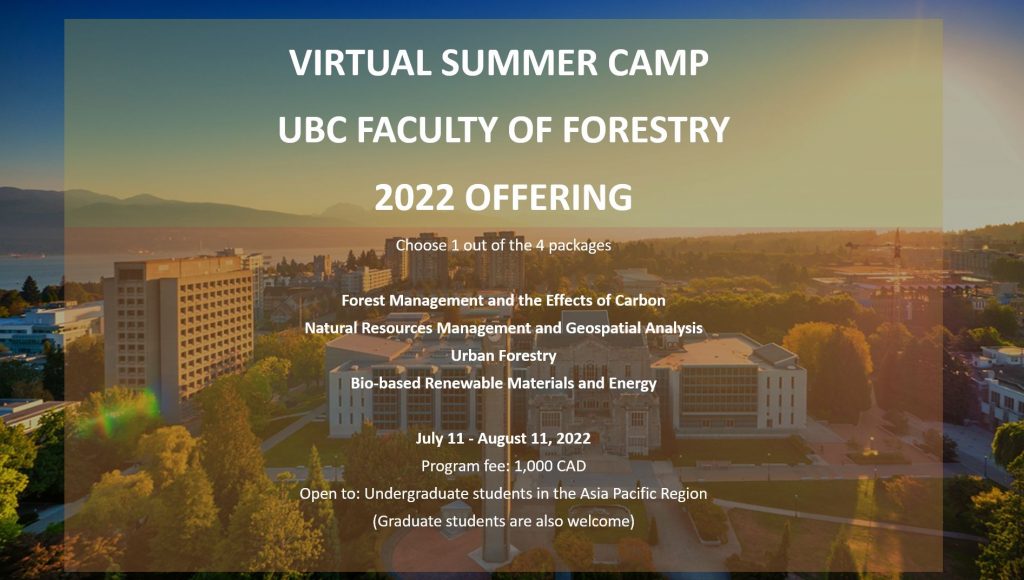We have hosted our Virtual Summer Camp (VSC) in 2020 and 2021 under the phenomenon of COVID-19 pandemic. Based on the current situation and expectations for the coming summer, there is little chance to offer our Vancouver summer program in person. To continue providing the alternative opportunity for the students to experience the teaching culture of UBC, the professional forest management of Canada, moreover the cultural diversity of Vancouver and the society of Canada, we plan to offer our next VSC in 2022. We will improve our programs based on the experience in 2020 and 2021, aiming to bring all students an impressive and prosperous summer.
Choose 1 out of the 4 packages
Package 1 Forest Management and the Effects of Carbon
COURSE A: SUSTAINABLE FOREST MANAGEMENT IN THE CHANGING WORLD
Forests provide multiple ecosystem functions and services that are invaluable for human wellbeing. Yet, the world’s remaining forests are under increasing pressure due to human activities and climate change. In this course, students will learn theoretical and practical knowledge about the criteria and indicators that are being used worldwide to guide sustainable forest management practices and explain how these will vary in a changing climate. Students will watch online lecture videos, live interactive discussions with the world’s renowned professors and experts, and conduct group discussions with global peers during the four weeks. To translate knowledge into practice, students will have various hands-on experience ranges from analyzing case studies to evaluating sustainable forest management worldwide using globally used criteria and indicators.
COURSE B: THE ECOLOGY, ECONOMICS, AND POLITICS OF CARBON
Climate change is the greatest threat to humanity due to higher carbon dioxide and other greenhouse gases concentration in the atmosphere. In this course, students will learn about ecology, economics, and politics of carbon and how it can be efficiently managed. Students will interact with the scholar, watch online videos, and conduct group discussions with peers from all over the world during the four weeks. To translate knowledge into practice, students will have various hands-on experiences analyzing carbon impact in your society and country to group video projects on the embedded carbon cost of everyday items you have used.
Package 2 Natural Resources Management and Geospatial Analysis
COURSE A: NATURAL RESOURCES MANAGEMENT
This is an intensive online course about the principles of natural resources (NR) management and protection in Canada in comparison with Asia —with a strong regional and global contextualization. Online lectures provide students with updated information and discussion points on four major topics:
- Natural resources overview: definition, classification and physical characterization of NR, monitoring and general management practices
- Structure and policy: land and NR ownership, government structure, stakeholders and international commitments
- Conservation: global status, Canada as a global player, methods for conservation in NRM, planning, techniques, applications, challenges, case studies and solutions
- Ecological integrity: land-use practices, national parks, biodiversity and First Nations
COURSE B: GEOSPATIAL APPLICATION IN NATURAL RESOURCES MONITORING
This course will describe the major approaches to natural resources monitoring and reporting, with a special focus on the application of remote sensing to the forestry industry. Online lectures will help students understand the importance of natural resources monitoring, and introduce them to four key topics:
- Definition of Remote Sensing: an overview of monitoring processes and the evolution of remote sensing and its application to the forestry sector
- Remote Sensing Basics: a review of physical principles underpinning remote sensing and the various technological products in use today
- Remote Sensing in Practice: a review of remote sensing data and various ways of analysis
Package 3 Urban Forestry
COURSE A: AN INTRODUCTION TO URBAN FORESTRY
This course will provide a general introduction to the concept of Urban Forestry and why this is an important topic in today’s rapidly urbanizing society. There is a growing need to adapt to multiple impacts of climate change; and increasing demand from the public for the recreational, psychological and health benefits that green-space networks provide. With increased urban populations, global warming, urban heat islands, flooding and pollution, cities may become unlivable or demand massive energy-use for cooling, unless we can establish large scale, healthy urban forest systems.
COURSE B: URBAN FORESTRY, RECREATION AND HUMAN WELL-BEING
Urban Forestry is about planning and managing urban green-spaces and ecosystems for human welfare, ecological health, and protection of our cities’ support systems. Urban forest networks, parks, wetlands, and other green infrastructures are vital in moderating heat waves and cooling demands, maintaining biodiversity and carbon sinks, controlling forest fires, storm-water flood mitigation, bio-energy production, etc. Urban forests improve and protect our health, property values, local jobs and businesses, outdoor recreation opportunities, and community character. This course will give the students an introduction to the importance of understanding Urban Forestry in the face of today’s rapid urbanization as forests and green systems compete for space among buildings, roads/transit, storage facilities, and energy infrastructure.
Package 4 Bio-based Renewable Materials and Energy
COURSE A: BIOENERGY AND BIOFUELS
This course provides an overview of bioenergy principles and explains the knowledge base as well as the cutting-edge technologies for the bioenergy and biofuels production. It consists of five modules in which students will learn the bioenergy and biofuels classification, biomass chemistry, biofuel production via biomass thermochemical conversion, biofuel production via biomass biochemical conversion as well as the life cycle analysis utilized in the biofuels commercialization.
COURSE B: BIO-BASED MATERIALS
This course is designed to equip students with fundamental knowledge of the existing primary biobased polymeric materials. The course will start to introduce general aspects including how nature synthesizes these biobased polymers, their physical and chemical properties, and biodegradability. This course will cover transformations biobased polymers for industrial polymer processing techniques and highlight the primary applications of nature-derived polymers in our daily life and the potential for use in new applications based on polymer structure property relationships.
Activities
- Asynchronous video lectures + Instructor-led facilitation and discussion
- Synchronous live lectures + Diverse live learning activities
- Synchronous cultural discovery
- Live presentation and experience sharing sessions about UBC, forestry faculty, Indigenous culture, Vancouver life and Canadian society
- Virtual tours of UBC campus, temperate rain forest and natural parks
Registration is open right now.
SCAN QR CODE TO APPLY
You could also register the program by Clicking Here
Contact information
UBC Asia Forest Research Centre
Assistant Director
Dr Suzy (Xueqin) Zeng
Email: suzy.zeng@ubc.ca

